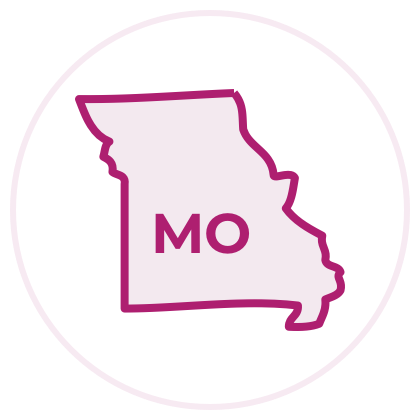Pre-Service Training
The Children’s Division, Department of Social Services, is using a new statewide training program called the Missouri Caregiver and Adoption Resource Education (MO C.A.R.E.) curriculum, which is an adaptation of the National Training and Development Curriculum for Foster and Adoptive Parents (NTDC). All foster and adoptive families must complete this 30-hour training.
Relative caregivers who wish to become licensed must complete a nine-hour relative caregiver training.
Any family, relative or otherwise, who intends to adopt must complete an additional seven-hour training entitled Missouri Adoption Resource Curriculum (MO ARC).
Services Offered Through the State’s Post-Permanency Support Program
The Children’s Division contracts with three private agencies—FosterAdopt Connect, Foster & Adoptive Care Coalition, and the Central Missouri Foster Care and Adoption Association—to operate regional Family Resource Centers (FRCs) across the state. Each FRC must provide a set of core services to adoptive, foster, and kinship families. Some of the FRCs also offer additional services under their state contracts.
Services include:
For more information, visit https://dss.mo.gov/cd/frc/index.htm
Geographic Area Covered
The Children’s Division contracts with three agencies to provide services in all of the state’s six regions. As noted above, core services are offered statewide, but additional services are offered in some regions.
Eligible Population for the Overall Post-Permanency Program
Accessibility
Each FRC may offer different supports and services to meet the specific needs of their local community, including training or support groups addressing the needs of diverse families.
Outreach and Engagement
Adoptive and guardianship families receive information about the Family Resource Centers through a variety of methods:
- Families are provided information and a brochure from their subsidy worker.
- The annual letter to families receiving subsidy includes information about the FRCs. It also includes a brief survey to assess families’ well-being.
- The Children’s Division publishes an electronic monthly newsletter for foster, adoptive, and guardianship families.
- Each month, the Children’s Division provides the FRCs a list of all foster, adoptive, guardianship, or kinship families. The FRCs sends a welcome letter to the new families to share information about services.
- Each FRC sends an annual letter about services to all families on the Children’s Division list.
- FRCs also conduct their own outreach and other engagement strategies to families and report on these efforts to the state.
How the Post-Permanency Program Is Operated
Notes About Who Provides Which Service(s)
The Children’s Division contracts with three different agencies to operate the FRCs:
- FosterAdopt Connect serves the southern, western and northern regions.
- Central Missouri Foster Care and Adoption Association serves central Missouri.
- Foster & Adoptive Care Coalition serves the St. Louis area.
Adoption/Guardianship Assistance/Subsidy Review and Changes
State subsidy workers send a letter annually to adoptive and guardianship families requesting educational information and inquiring if any changes have occurred.
Adoptive and guardianship families may request changes to their adoption/guardianship assistance agreement at any time, in person or in writing. Modifications are prompted by changes in family circumstances or the child’s needs. Requests for assistance beyond the basic subsidy package require supporting documentation.
Tracking Adoption/Guardianship Discontinuity
The state does not change or alter a child’s or youth’s identification number assigned upon entering care after the finalization of an adoption or guardianship. Therefore, the state can quickly identify if a child or youth returns to care. The state publishes a quarterly report on this data. For those children and youth who are placed through private or intercountry adoptions, these are tracked by private child-placing agencies, which provide status reports to the Children’s Division.
Post-Permanency Program Spending (FY 2023)
Funding Sources for the Post-Permanency Program (FY 2023)
- State funds
- Title IV-E funds (including Prevention Services Grant Program/PSGP or IV-E training dollars)
- Adoption savings (reported on CB 496 Part 4 – Annual Adoption Savings Report)


